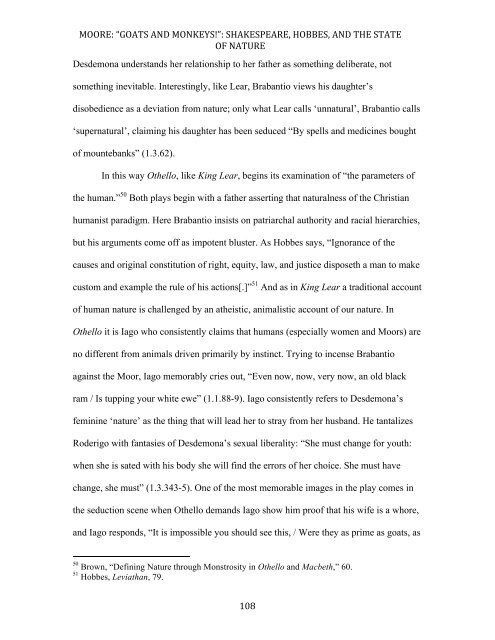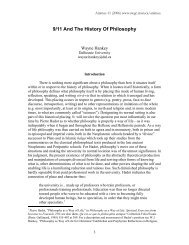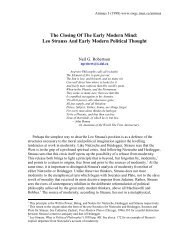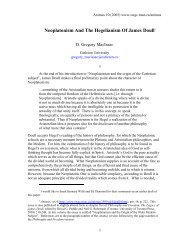âgoats and monkeys!â: shakespeare, hobbes, and the state of nature
âgoats and monkeys!â: shakespeare, hobbes, and the state of nature
âgoats and monkeys!â: shakespeare, hobbes, and the state of nature
You also want an ePaper? Increase the reach of your titles
YUMPU automatically turns print PDFs into web optimized ePapers that Google loves.
MOORE: “GOATS AND MONKEYS!”: SHAKESPEARE, HOBBES, AND THE STATE <br />
OF NATURE <br />
Desdemona underst<strong>and</strong>s her relationship to her fa<strong>the</strong>r as something deliberate, not<br />
something inevitable. Interestingly, like Lear, Brabantio views his daughter’s<br />
disobedience as a deviation from <strong>nature</strong>; only what Lear calls ‘unnatural’, Brabantio calls<br />
‘supernatural’, claiming his daughter has been seduced “By spells <strong>and</strong> medicines bought<br />
<strong>of</strong> mountebanks” (1.3.62).<br />
In this way O<strong>the</strong>llo, like King Lear, begins its examination <strong>of</strong> “<strong>the</strong> parameters <strong>of</strong><br />
<strong>the</strong> human.” 50 Both plays begin with a fa<strong>the</strong>r asserting that naturalness <strong>of</strong> <strong>the</strong> Christian<br />
humanist paradigm. Here Brabantio insists on patriarchal authority <strong>and</strong> racial hierarchies,<br />
but his arguments come <strong>of</strong>f as impotent bluster. As Hobbes says, “Ignorance <strong>of</strong> <strong>the</strong><br />
causes <strong>and</strong> original constitution <strong>of</strong> right, equity, law, <strong>and</strong> justice disposeth a man to make<br />
custom <strong>and</strong> example <strong>the</strong> rule <strong>of</strong> his actions[.]” 51 And as in King Lear a traditional account<br />
<strong>of</strong> human <strong>nature</strong> is challenged by an a<strong>the</strong>istic, animalistic account <strong>of</strong> our <strong>nature</strong>. In<br />
O<strong>the</strong>llo it is Iago who consistently claims that humans (especially women <strong>and</strong> Moors) are<br />
no different from animals driven primarily by instinct. Trying to incense Brabantio<br />
against <strong>the</strong> Moor, Iago memorably cries out, “Even now, now, very now, an old black<br />
ram / Is tupping your white ewe” (1.1.88-9). Iago consistently refers to Desdemona’s<br />
feminine ‘<strong>nature</strong>’ as <strong>the</strong> thing that will lead her to stray from her husb<strong>and</strong>. He tantalizes<br />
Roderigo with fantasies <strong>of</strong> Desdemona’s sexual liberality: “She must change for youth:<br />
when she is sated with his body she will find <strong>the</strong> errors <strong>of</strong> her choice. She must have<br />
change, she must” (1.3.343-5). One <strong>of</strong> <strong>the</strong> most memorable images in <strong>the</strong> play comes in<br />
<strong>the</strong> seduction scene when O<strong>the</strong>llo dem<strong>and</strong>s Iago show him pro<strong>of</strong> that his wife is a whore,<br />
<strong>and</strong> Iago responds, “It is impossible you should see this, / Were <strong>the</strong>y as prime as goats, as<br />
50 Brown, “Defining Nature through Monstrosity in O<strong>the</strong>llo <strong>and</strong> Macbeth,” 60.<br />
51 Hobbes, Leviathan, 79.<br />
108
















